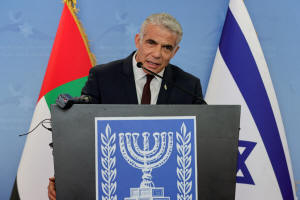Israel seeks to extend new Gulf ties to all Middle East, says Lapid
 Send a link to a friend
Send a link to a friend
 [June 30, 2021]
By Lisa Barrington [June 30, 2021]
By Lisa Barrington
DUBAI (Reuters) - Israel's foreign minister
said on Wednesday his visit to the United Arab Emirates was just the
start of a road to peace with other Middle East countries, signalling an
offer of friendship with Arab states still wary of normalising ties.
Yair Lapid, the first Israeli cabinet minister to visit the Gulf state
since the countries forged ties last year, also reiterated Israel's
concern about the Iran nuclear deal being negotiated in Vienna.
The trip comes amid unease in Israel and Arab capitals about U.S.
efforts to re-enter a 2015 nuclear pact between Iran and world powers,
which then President Donald Trump quit in 2018 in a move backed by Saudi
Arabia and its Gulf allies.
"This visit isn't the end of the road to peace, it is just the
beginning," he told reporters. "Our hand is outstretched... I hope this
visit is the first of many and that together with our new friends we
continue to make history in the entire region."
The UAE and Bahrain normalised ties with Israel under so-called "Abraham
Accords" brokered by Trump's administration, creating a new regional
dynamic based on mutual concern over Iran and Islamist groups. Sudan and
Morocco followed suit.

The agreements in effect challenged a decades-old allegiance to the
Palestinian issue as a major driver of Arab policy.
Lapid declined to comment on whether Israel was coordinating with Gulf
states over Iran, saying he did not want to "embarrass" his hosts by
remarking on a neighbour while in the UAE, but noted his country was
worried about the nuclear deal.
"What we need to do is to make sure that what we are going to have on
Iran is a good agreement," he said, adding that Israel was discussing
the matter with the United States.
Gulf states have called for a stronger deal of longer duration that also
addresses Tehran's missiles programme and support for regional proxies.
[to top of second column]
|

Israeli alternate Prime Minister and Foreign Minister Yair Lapid
speaks during a news conference in Dubai, United Arab Emirates, June
30, 2021. REUTERS/Christopher Pike

The Vienna talks aim to bring Iran and the United
States back into full compliance with the pact that placed
restrictions on Tehran's nuclear activities in exchange for lifting
international sanctions. Trump had reimposed harsh U.S. sanctions
and Iran responded by violating many restrictions.
During his two-day visit Lapid inaugurated Israel's temporary
embassy in Abu Dhabi and consulate in Dubai, where he toured his
country's pavilion at the Expo 2020 site where the emirate will host
the world fair starting October.
The Abraham Accords have also been billed by the signatories as an
economic boon, and on Wednesday Israel and the UAE said they had
started talks on a free trade agreement, according to a joint
statement carried on state news agency WAM. The UAE and Israel have
previously signed agreements for tourism, investment and cooperation
in fields from energy to technology.
Lapid said he expected more deals to be inked between Israel and the
UAE which would demonstrate what happens when countries choose
cooperation over conflict.
While opening the Dubai consulate, he hailed "the ability to
cooperate. To find good partners and work together with them. To
connect intelligence to intelligence, ambition to ambition."
(Reporting by Lisa Barrington; Writing by Ghaida Ghantous, Editing
by William Maclean)
[© 2021 Thomson Reuters. All rights
reserved.] Copyright 2021 Reuters. All rights reserved. This material may not be published,
broadcast, rewritten or redistributed.
Thompson Reuters is solely responsible for this content.
 |